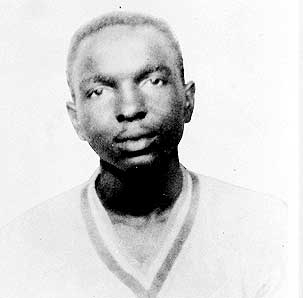James Earl Chaney was a civil rights activist and a member of the Congress of Racial Equality (CORE). On June 21, 1964, Chaney, along with CORE members Andrew Goodman and Michael Schwerner, were murdered by members of the Ku Klux Klan in Philadelphia, Mississippi. Chaney was born on May 30, 1943, to Fannie Lee and Ben Chaney in Meridian, Mississippi. He had an older brother, Ben, and three sisters, Barbara, Janice, and Julia. Chaney’s parents separated when he was young.
Chaney attended Saint Joseph’s Catholic Church School from Kindergarten to ninth grade. He then attended Harris Junior College High School in Meridian, Mississippi. While there, he became captain of the school’s football and track teams. In 1958, as part of a recruiting program, 15-year-old Chaney and two young members of the local NAACP Branch initiated wearing paper badges with the letters NAACP on them to school. Fearing reprisals from the all-White school board and to halt the political consciousness that was occurring at the school at the time, the principal suspended Chaney and others for a week. In 1962, 19-year-old Chaney participated in a Freedom Ride from Nashville, Tennessee, to Greenville, Mississippi, and another from Greenville to Meridian, Mississippi. When the bus finally made it to Meridian, Chaney and the other Freedom Riders were threatened with arrest and warned for their safety not to loiter around the bus station or attempt to integrate the lunch counter where crowds of segregations waited.
In late 1963, Chaney joined the Meridian chapter of the Congress of Racial Equality (CORE) and began organizing voter education classes, introduced CORE workers to local church leaders, and helped CORE workers get around the counties where the Ku Klux Klan had a heavy presence. On June 16, 1964, armed members of the Mississippi White Knights of the Ku Klux Klan firebombed the Mount Zion Methodist Church in Longdale, Mississippi, a rural community in Neshoba County. The church was attacked because Chaney, Michael Schwerner, and church leaders made plans for it to be used as a training site for voter registration classes for disfranchised Black women and men around rural Neshoba County.
On June 21, 1964, Chaney was with Schwerner and Andrew Goodman when all three were arrested by Deputy Sheriff Cecil Price for an alleged traffic violation and taken to the Neshoba County Jail. They were released later that evening. On their way back to Meridian, they were stopped by patrol lights and two carloads of Ku Klux Klan members on Highway 19 near Philadelphia, Mississippi. The three were taken into Price’s car to a remote rural road. There, Klan members killed all three and buried their bodies at a nearby earthen dam. The bodies remained undiscovered for 44 days until found on August 4, 1964. Their murders became a significant national story that caught the attention of the Federal Bureau of Investigation (FBI).
Schwerner’s wife, Rita Schwerner, criticized the national attention the murders attracted, saying the public got involved only because Schwerner and Goodman were white. She said the case would not have gained much attention if Chaney who was 21 and Black, was the only victim.
Several Ku Klux Klan members who were involved in the murders would later be convicted, including Price, Samuel Bowers, Edgar Ray Killen, Alton Wayne Robert, and Jimmy Snowden. In 2014, Chaney Goodman and Schwerner received a posthumous Presidential Medal of Freedom from President Barack Obama.
Do you find this information helpful? A small donation would help us keep this available to all. Forego a bottle of soda and donate its cost to us for the information you just learned, and feel good about helping to make it available to everyone.
BlackPast.org is a 501(c)(3) non-profit and our EIN is 26-1625373. Your donation is fully tax-deductible.
“James Earl Chaney,” PBS, https://www.pbs.org/wgbh/americanexperience/features/freedomsummer-murder/; “James Earl Chaney,” The James Earl Chaney Foundation, https://www.jecf.org/History.htm; “James Earl Chaney,” Find a Grave,https://www.findagrave.com/memorial/6442194/james-earl-chaney.

